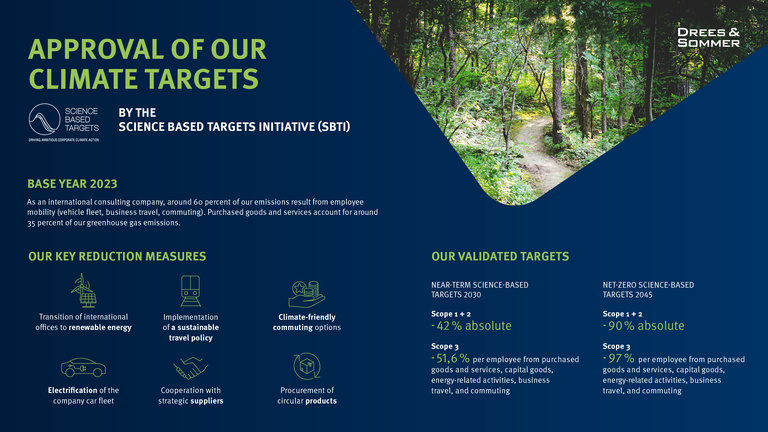Stuttgart, Germany, April 22, 2025. The more than 6,000-strong global consultancy Drees & Sommer SE, which specializes in construction, real estate and infrastructure, sets an example for sustainability on Earth Day: the Science Based Targets initiative (SBTi) has now officially validated the Stuttgart-headquartered consulting company’s short-term and long-term net-zero targets. The climate pathway taken with Drees & Sommer's greenhouse gas reduction targets meets the SBTi Corporate Net-Zero Standard. What can individuals do about global warming? On this year's Earth Day, the aim is to dispel doubts of this type in Germany with the motto ‘You make all the difference’: a vacation at home instead of a trip abroad, fair trade instead of fast fashion, or solar panels for own green energy. “Every contribution counts, with Earth Day raising our awareness in this regard. Making a difference when an individual becomes part of a larger chain reaction: what applies on the personal level applies all the more to companies,“ says Johanna Wild, Head of Corporate Sustainability Management at Drees & Sommer. As a global movement, Earth Day now mobilizes over a billion people in more than 150 countries. This is linked to the requirement to reduce greenhouse gas emissions much more quickly and, by doing so, consistently implement the sustainable transformation of our society and industries. From Net Plus Energy Houses to Cradle to Cradle: Drees & Sommer Actively Contributes to Shaping a Climate-Friendly Future Drees & Sommer has been supporting the public sector and the economy for decades in the sustainable transformation of construction, real estate and infrastructure projects: from the expansion of renewable energy through net plus energy houses to the integration of a circular economy approach – known as ‘Cradle to Cradle’ – for the protection of resources. Several companies entrusted Drees & Sommer with the task of designing net-zero carbon road maps, for example. They include strategic measures for the decarbonization of business models and production sites. Dr. Peter Mösle, Senior Executive at Drees & Sommer, comments: “Companies and financial institutions play an active role in the fight against climate change. They need to increase the scope and speed of greenhouse gas reductions a lot more, also in order to maintain their competitiveness. It is then only logical that our own sustainability targets must be ambitious and, above all, scientifically sound." This is exactly where the Science Based Targets initiative (SBTi) comes in. It has developed the world's leading framework for setting science-based net-zero targets. Applying this framework ensures that companies and organizations develop climate targets that are in line with the 1.5 degree target set in the Paris Climate Agreement. As a non-profit organization with a subsidiary for validating targets, the SBTi works closely with partners such as the Carbon Disclosure Project (CDP),the UN Global Compact, the We Mean Business Coalition, the World Resources Institute (WRI) and the World Wide Fund for Nature (WWF). It defines best practices, offers technical support and independently validates firms' climate targets. Validation by the SBTi confirms Drees & Sommer's science-based net-zero approach, which is consistent with the Paris Climate Agreement. Drees & Sommer’s Net-Zero Pathway As defined by the internationally accepted Greenhouse Gas Protocol (GHG), greenhouse gases are classified in three categories: Scope 1, Scope 2 und Scope 3. Scope 1 covers all emissions from sources that an organization owns or controls directly. Scope 2 are emissions that come from where the energy it purchases and uses is produced (e.g. electricity). Scope 3 encompasses all indirect emissions along the value-added chain; as for Drees & Sommer, these are mostly emissions from purchased goods and services, business travel and employee commuting. Near-Term Targets Drees & Sommer commits to reduce Scope 1 and Scope 2 GHG emissions by 42 percent (absolute value) by 2030, from a 2023 base year. Drees & Sommer also commits to reducing Scope 3 GHG emissions from purchased goods and services, capital goods, fuel and energy related activities, business travel and employee commuting by 51.6 percent per full-time equivalent (FTE) within the same timeframe. Long-Term Targets Drees & Sommer commits to reducing Scope 1 and Scope 2 GHG emissions by 90 percent (absolute value) by 2045, from the base year 2023. Drees & Sommer also commits to reduce Scope 3 GHG emissions from purchased goods and services, capital goods, fuel and energy related activities, business travel, and employee commuting by 97 percent per full-time equivalent (FTE) within the same timeframe. Greatest Leverage for Carbon Dioxide Mitigation Lies in Mobility Johanna Wild explains: “We switched to 100 percent green electricity at an early stage for all our German locations and for the data center capacities that we use. We also drove forward our office design and facilities along sustainable lines. As an international consulting company, our greatest leverage for carbon dioxide savings lies in mobility. We have considerable potential for making carbon savings in our business trips and our vehicle fleet. We aspire to fully electrify our vehicle fleet, incentivize climate-friendly employee commuting behavior, and intend to reduce corporate flights. In addition, we will closely collaborate with our suppliers and steadily increase the share of reusable and recyclable products.“ About SBTi Die Science Based Targets initiative (SBTi) enables companies and financial institutions worldwide to set targets across all scopes that align with pathways limiting global warming to 1.5°C. They develop clear standards, tools and guidance which allow companies to set greenhouse gas (GHG) emissions reductions targets in line with what is needed to keep global heating to safer levels and reach net-zero by no later than 2050. As a non-profit organization with a subsidiary which hosts the target validation services, SBTi closely cooperates with partners such as CDP, the UN Global Compact, the We Mean Business Coalition, the World Resources Institute (WRI) and the World Wide Fund for Nature (WWF). It defines best practices, offers technical support and independently assesses and validates corporate climate targets. For more details, please click here: Ambitious corporate climate action - Science Based Targets initiative |
Press Releases

